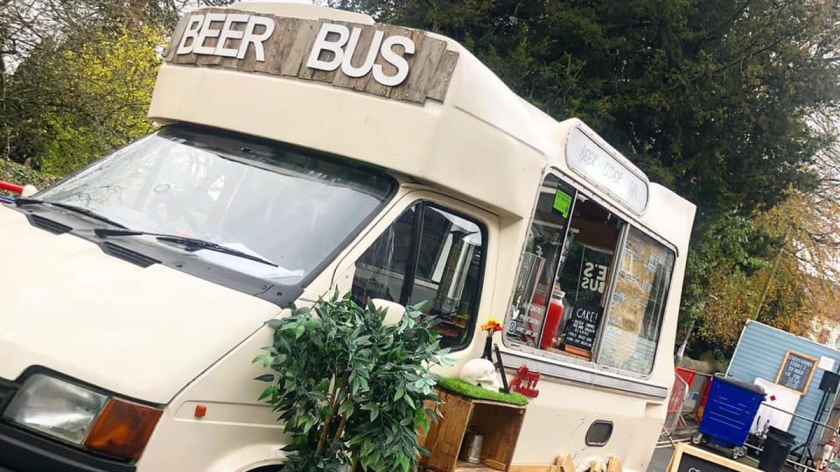Alfie’s Beer Bus found a niche as an offbeat character at events in the U.K. — like an ice cream truck, only with alcohol. Then the coronavirus came.
“Alfie’s Beer Bus is a mobile bar which depends primarily on events, meaning that we were initially very worried when lockdown measures and other restrictions were announced,” said Paul Cammack, founder and owner of Alfie’s.
The beer bus shifted its gears, turning to a mix of an online store, social tools and a direct link to checkout to adapt to the times. The weddings and parties are gone for now, replaced by people isolated at home, turning to virtual happy hours and video meetups.
The Alfie's spirits truck became a delivery vehicle, requiring a new online store and checkout.
Alfie’s added an interface and virtual storefront that Cammack describes as basic, but it allows the bus’ products to shine for consumers, who can also order and buy products directly. “All you have to do is find a photo, then add a title, a description and a price and you're done,” Cammack said, adding much of the work was done with an iPhone.

The challenges small businesses face can’t be understated. The coronavirus lockdowns closed businesses for months, and the reopenings come with financial hardships and changes in customer patterns to accommodate — and in many cases, enforce — a decline in foot traffic. Still, other stores are in communities that have seen scattered incidents of vandalism amid the largely peaceful protests following the murder of George Floyd. These stores may need to delay their reopenings to accommodate repairs.
Some of the changes, such as spacing out tables at restaurants or other social distancing tactics, will probably be temporary; but other responses such as digital shopping are permanent.
A bipartisan group of lawmakers introduced legislation Wednesday to enable small businesses to deduct their expenses even if they have received a loan from the federal government’s Paycheck Protection Protection Program that was later forgiven.
The privately held firm recruited more than 160 reps in the first quarter on the strength of its balance sheet, CEO Amy Webber says.
The Settlement Days program is trying out remote options in Detroit and Atlanta.
“Digital storefronts that many businesses put up to enable e-commerce are likely to remain and be developed further,” said Zil Bareisis, head of retail banking at Celent. “I would also expect those merchants that turn on contactless on their POS terminals during the crisis will keep it on afterwards."
Businesses need capital to fix liquidity problems from being shut down for up to two months, and tools to migrate more of their businesses to digital shopping and payments, often through social media sites.
“The current situation we all find ourselves in has put incredible strain on small to medium sized enterprises, and even with restrictions being slowly lifted there is still a huge amount of adapting to be done,” said Or Perlman, U.K. country lead at SumUp, which provided the technology that powered Alfie's online store.
With physical shops being closed or restricted, social media is very much a lifeline for many small businesses in deeping people updated with their development, or even letting people know they are still open, Perlman said. "Small businesses don't need to become tech entrepreneurs. They only need to post [a message saying], 'order through the link in my profile.'"
Payment technology companies have pushed tools to move companies online faster, often approaching businesses that previously had little or no digital footprint before, while also turning to alternative lending to provide more capital to businesses.
The urgency is putting existing tools to work faster. Credit lines and crowdfunding are filling PPP gaps; while online storefronts and in-app buy buttons are getting a fresh look as ways to move offline sales to social media sites. Alfie’s Beer Bus is lucky in that it already has the last mile figured out.
"It’ll definitely be a platform we will continue to use once the lockdown has lifted. Lockdown has also given us time to focus on our other business, Alfie’s Coffee Company,” Cammack said.
Small businesses are under particular stress because of the relatively low amount of cash most have on hand, usually less than a month’s worth. But smaller businesses can also adjust faster.
“Small businesses are incredibly resilient,” said Sam Taussig, head of global policy at Kabbage. “Bakeries and restaurants quickly converted to selling basic pantry goods to consumers having difficulty finding these items in local stores. Tailors and manufacturers converted their business to make masks for first responders and health care providers.”
Small businesses are rapidly adopting digital solutions in light of the crisis, Taussig said, reporting Kabbage has seen spikes of demand for new products. Its payment product has seen a 300% growth in the past three months as more businesses traditionally slower to adopt technology needed to find digital, contactless means to accept payments and conduct business during shelter-in-place orders.
The growth of contactless payments payments can also provide small businesses with more information about consumers, their shopping habits and preferences when tied to apps or other merchant sites, argues Jason Thomas, CEO of Tappit, which provides payment technology for event facilities, most of which are still closed but will likely face different ticketing and concession practices upon return.
“This data delivers operational efficiencies, increases consumer spending and most importantly, enables a full view of each and every fan,” Thomas said.







